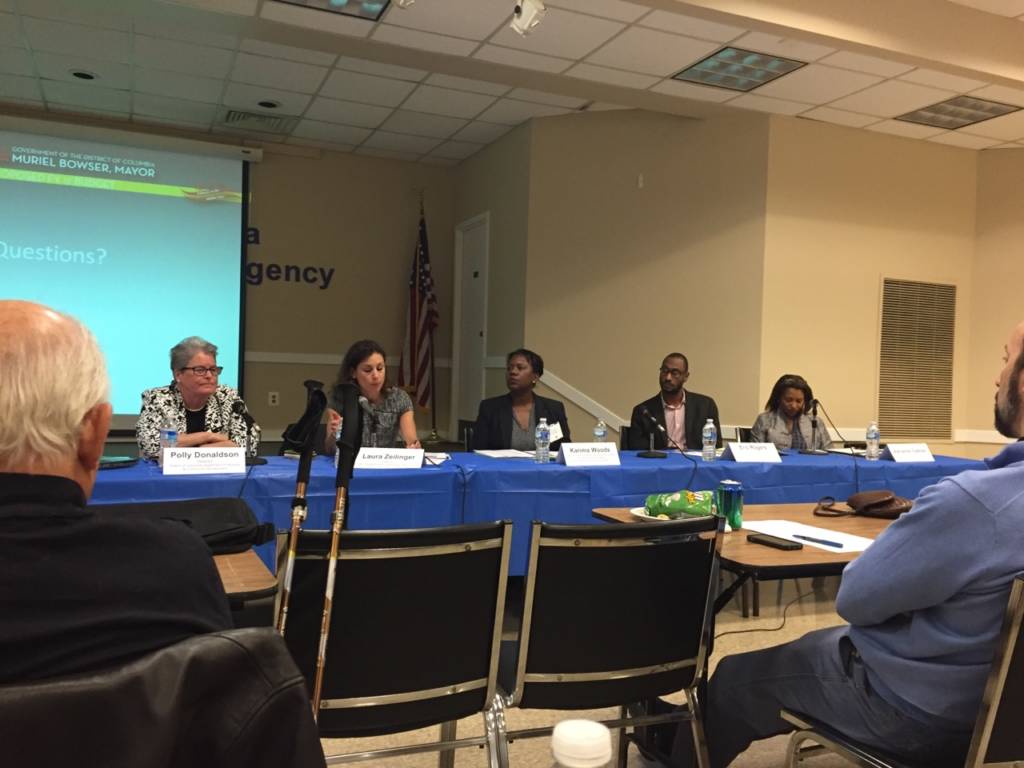Mayor Muriel Bowser presented her Fiscal Year 2017 budget proposal to District Councilmembers late last month. It includes an additional $13.1 million toward homeless services and a $10 million extension for the Temporary Assistance for Needy Families (TANF) program, among other investments.
Representatives from the mayor’s office engaged with the public to gather input at a March 31 budget briefing organized by the Coalition for Nonprofit Housing and Economic Development. The so-called “Fair-shot” budget, which has been in development since last fall, is all about community priorities, said D.C. Department of Housing and Community Development (DHCD) Director Polly Donaldson.
For more in-depth information about how resources will be allocated toward some of these priorities, Street Sense sat down with Jay Melder, chief of staff at the Department of Human Services.
What specific strategies are being implemented to prevent families from falling into homelessness, and how will the budget impact those efforts?
Melder: The $13 million investment toward homeless services is a continuation of investments made in FY2016, which was the first time the District funded a homelessness prevention program specifically for families.
Last year, $2 million was placed specifically into prevention programs and another $1 million is being added to that this year.
“This prevention program is designed to catch families and keep them stable where they are, and really support them where they are. We want to make sure that the shelter doesn’t become the front door for housing solutions.”
Homeless prevention programs should give people the support they need to maintain stability, such as help with rent, utilities, bills and groceries.
“Sometimes just the small things can help a situation become a lot more tenable.”
Thus far, the District’s homeless prevention efforts have helped over 900 families stay out of homelessness. This new funding will continue those efforts.
Why was TANF extended again? Will it be extended another year for Fiscal Year 2018?
Melder: The reason for this extension–which provides an additional $10 million to continue to assist families who have received TANF benefits for longer than the program’s 60-month limit — is different than the reason for last year’s TANF extension.
Last year, with the FY2016 budget, the Department of Human Services felt as though we had not held up our end of the bargain for families in the TANF program. There is a lot more to be done and this extension is primarily about allowing time for the community to talk about better solutions.
“We’re going to see a lot of policy about the TANF extension moving forward, and we’re going to have to work with the council, the community and our TANF experts in the D.C. government to shape a policy that’s going to work.”
I cannot be certain, but TANF probably will not be extended again for the 2018 fiscal year. “I think that this is about getting it done this year,”
At the March 31 budget briefing, Department of Human Services Director Laura Zeilinger said that the extension includes ongoing monthly benefits for families who would be ineligible under the current law. “We’re going to offer this extension one time,” Zeilinger said. “We’re going to improve the services we offer.”
What changes can we expect to see to Department of Human Services over the next year?
Melder: The Department of Human Services will continue to invest in the Interagency Council on Homelessness’ strategic plan to make homelessness rare, brief and non-recurring. In order to do that, a $13.1 million increase has been granted for proven solutions, such as permanent supportive housing, rapid rehousing and targeted affordable housing.
Supplementing, bolstering and enhancing these solutions will be the most efficient way to end homelessness in the District. Furthermore, it is essential to create a balance between short-term solutions and long-term solutions.
“In years past there’s been less of a focus on how people get out of homelessness, but instead on how to manage it with a shelter system. We have to have a homelessness system that lifts people back up quickly, keeps people from falling into homelessness and makes sure that they stay out of it.”
Will any of this budget go toward the improvement of shelter conditions?
Melder: This new contract allows the Department of Human Services to look at methods to improve shelters using money that is already spent. The Pat Handy Place for Women, a brand-new shelter built as part of the DC General closure plan, is the vision for all future low-barrier shelters.
The District will also work directly with local communities to get input on what the design should be. However, for people in shelters and also those living in encampments, the solution is a permanent home or apartment of their own.
“We need to make low-barrier shelters more dignified, but we have to make sure we’re investing in housing solutions that work.”
Will the cost of encampment enclosures stay the same?
Melder: “I would imagine that [the cost of encampment closures] stays roughly the same”
Is there a plan for the new DC General replacement shelters once their leases are up?
Melder: “We’ll always need a crisis response system for families. We’re extremely confident in the District’s ability to renew those leases and negotiate what we need when we need it.”
What is the plan for families currently staying in hotels and motels as overflow shelters when the DC General replacement facilities open?
Melder: At the present, there are a little under 900 people in overflow locations. But they are not same people who were there last month.
“It’s not going to be the same families, these families are resilient folks going through a tough time, getting the resources they need to be out and back in the community. We’ll be supporting families going through the same things, but not the same people.”








